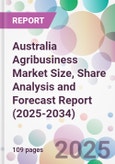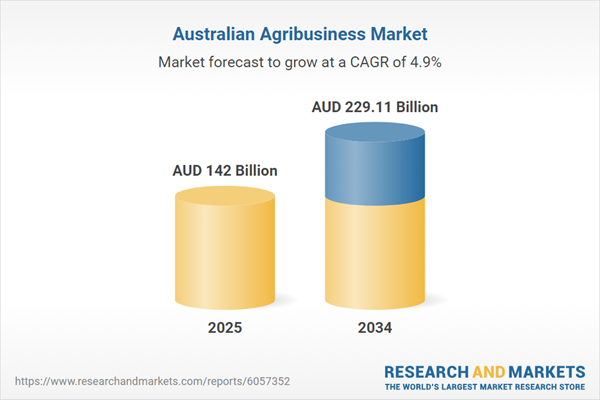According to the Australia agribusiness market analysis, agribusiness encompasses the full spectrum of operations involved in the production, processing, distribution, and marketing of agricultural products. This includes activities related to farming, the supply of agricultural inputs like seeds, fertilisers, and machinery, food processing, packaging, logistics, and retailing.
Agribusiness is divided into segments including agrichemicals, machinery and equipment, breeding, and seed businesses. Agrichemicals such as fertilisers, herbicides, and pesticides help farmers optimise crop yields by controlling pests and weeds, improving soil fertility, and ensuring healthier plant growth. This increased productivity directly contributes to higher agricultural output and farm profitability, further driving the growth of the Australia agribusiness market.
According to the Department of Agriculture, Fisheries and Forestry, dairy is one of Australia’s most important rural industries, which produced about 8.8 billion litres of milk in 2022-23 and employed approximately 33,500 people. It is the third-largest rural industry in Australia which generated USD 6.1 billion in farm gate value in 2022-23.
The industry is evolving through technology adoption such as precision agriculture and digitalization for data-driven decisions. Sustainable farming practices, innovations in value-added products, and enhanced supply chain efficiency bolster competitiveness. Government support, climate resilience strategies, and alignment with consumer trends further drive growth and sustainability in global agriculture leadership.
This report offers a detailed analysis of the market based on the following segments:
Market Breakup by Product
- Grains
- Livestock
- Oilseeds
- Dairy
- Others
Market Breakup by Applications
- Agrichemicals
- Machinery and Equipment
- Breeding
- Seed Businesses
Market Breakup by Region
- New South Wales
- Victoria
- Queensland
- Australian Capital Territory
- Western Australia
- Others
Australia Agribusiness Market Share
Livestock products led Australia's agribusiness market due to their essential role in domestic consumption, job creation, integration within the value chain, global competitiveness, technological advancements, and commitment to sustainable practices, collectively driving economic growth and industry leadership.Leading Companies in the Australia Agribusiness Market
The growth of the agribusiness market is fuelled by increased supply chain innovations and investment in agricultural research and infrastructure. Furthermore, diversification into value-added products such as organic produce and functional foods allows Australian agribusinesses to capture higher margins and penetrate niche markets domestically and globally.- Australian Agricultural Company Limited
- Cargill Australia Ltd Incorporated
- Meat & Livestock Australia Limited
- Grain Crop Limited
- The North Australian Pastoral Company Pty Limited
- Nufarm Ltd.
- Bega Cheese Limited
- Saputo Dairy Australia Pty Ltd.
- Wilmar Sugar Pty Ltd.
- Elders Limited
- Others
Table of Contents
Companies Mentioned
- Australian Agricultural Company Limited
- Cargill Australia Ltd Incorporated
- Meat & Livestock Australia Limited
- Grain Crop Limited
- The North Australian Pastoral Company Pty Limited
- Nufarm Ltd
- Bega Cheese Limited
- Saputo Dairy Australia Pty Ltd
- Wilmar Sugar Pty Ltd
- Elders Limited
Table Information
| Report Attribute | Details |
|---|---|
| No. of Pages | 109 |
| Published | October 2025 |
| Forecast Period | 2025 - 2034 |
| Estimated Market Value ( AUD | $ 142 Billion |
| Forecasted Market Value ( AUD | $ 229.11 Billion |
| Compound Annual Growth Rate | 4.9% |
| Regions Covered | Australia |
| No. of Companies Mentioned | 10 |









